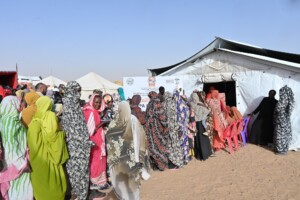Aragi, police, and corruption in Sudan
The harsh punishment for the production, possession, and consumption of alcohol as stipulated in Sudan’s Islamic-oriented laws of 1983 and the 1991 Criminal Act has led to a corrupting situation, says the Sudan Democracy First Group (SDFG).
In many places, usually at the fringes of large Sudanese towns, poor, often displaced women produce and sell locally made alcohol (aragi), as it is a profitable trade that does not need a lot of money to invest in.
The harsh punishment for the production, possession, and consumption of alcohol as stipulated in Sudan's Islamic-oriented laws of 1983 and the 1991 Criminal Act has led to a corrupting situation, says the Sudan Democracy First Group (SDFG).
In many places, usually at the fringes of large Sudanese towns, poor, often displaced women produce and sell locally made alcohol (aragi), as it is a profitable trade that does not need a lot of money to invest in.
Women charged with making, storing, or selling aragi are often convicted to a two-month imprisonment, in addition to a fine amounting between SDG1,500 ($244) and SDG10,000 and ($1,630). In case of failure to pay the fine, there is a four to six-month imprisonment, depending on the amount of the fine.
Corruption in this field, widespread in most parts of the country, involves policemen who carry out regular raids on places known for bootlegging. They haggle with the women who are caught making or selling aragi over the amount to be paid in order to release them instead of pressing charges. The women very often succumb to “this blackmailing”, SDFG states in its report, instead of being sentenced to imprisonment and a hefty fine.
Survey
The activist group conducted a survey among ten women involved in bootlegging in two different neighbourhoods in a capital city of a Sudanese state. Eight women said that they were blackmailed by policemen, while six of them stated they were blackmailed more than once.
All women said that the police raids take no specific pattern, and therefore it was not possible to mention the number of raids per day. However, they said there are often two raids per day: a morning raid, targeting the houses where aragi is produced and an evening raid targeting the place where it is sold.
The respondents unanimously reported unofficial raids by some policemen without their superiors being aware of them. They knew this from other policemen. These unofficial raids usually take place after midnight.
There is no specific amount of money agreed to in the settlements between the policemen and the women. It depends on the quantity of alcohol seized, the mood of the policemen carrying out the raids, and the bargaining ability of the bootleggers. However the interviewed women said that the minimum amount to be paid was SDG500 SDG ($81) and the highest amount paid was SDG1,000 ($163) SDG. Eight women reported that the settlement is usually finalised by policemen and non-commissioned officers while senior officers are unaware of it.
Retired policemen who used to participate in similar anti-bootlegging raids in the same locality, confirmed that the findings by SDFG were accurate.
Root causes
“To deal with these issues and avoid the negative consequences caused by these practices, the authorities have to address the root causes of bootlegging,” the SDFG report reads.
According to the SDFG, bootlegging practices have flourished since 1983 when alcohol became prohibited in the country. The Sudanese Criminal Act of 1991 has further led to corrupt legal procedures instead of eradicating the production and sale of alcohol.
The activist group advises the Sudanese government to allow local and foreign organisations to support the poor with finding alternative means for a decent livelihood. The Sudanese police force should provide the necessary attention to the anti-bootlegging raids by developing strict administrative control to ensure integrity.
Sudan Transparency Initiative
The SDFG was formed as an umbrella group of leading Sudanese independent and democratic civil society and media actors to serve as a think tank and venue for indigenous research, analysis and advocacy on human rights, development, peace and democratic transformation in Sudan.
It launched its Sudan Transparency Initiative in March 2015 with the series Petty Corruption Stories from Sudan, to “highlight the scope and magnitude of the petty corruption experienced by Sudanese people in day-to-day exchanges with the government, private, and civil sectors”.
The story on bootlegging and police corruption was published on 26 October.











 and then
and then